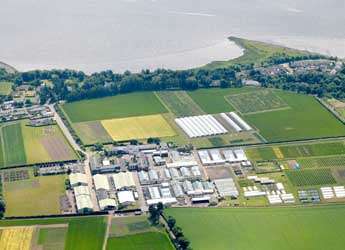

James Hutton Institute
The James Hutton Institute was formed in April 2011 from the merger of the Macaulay Land Use Research Institute (MLURI) and the Scottish Crop Research Institute (SCRI), to combine their strengths in land-use and environmental research. The institute uses interdisciplinary approaches to work on key global issues such as food, energy and environmental security, and on technological and management approaches to tackle these issues.
The JHI employs more than 600 scientists and support staff from a variety of natural and social science disciplines, making it one of the biggest research centres in the UK. It is based in two main sites in Scotland (at Aberdeen and Dundee) but works on projects across Scotland, Europe, and also in many developing countries. JHI places great importance on emphasising the relevance of its research to decision-makers at different scales and sectors, from policy-makers to land-managers. It therefore has particular expertise and interest in developing effective science-policy-practice interfaces.
In case you wonder, the institute is named after James Hutton (1726 – 1797), who was a leading figure of the Scottish Enlightenment, an eighteenth century ‘golden age’ of intellectual and scientific achievements centred on Edinburgh. He is internationally regarded as the founder of modern geology and one of the first scientists to describe the Earth as a living system. His thinking on natural selection influenced Charles Darwin in developing his theory of evolution.
Juan Pablo is a Social and Cultural Anthropologist, graduated with Masters in Sustainable Rural Development and in International Cooperation and Project Management. His work experience is based on collaboration with various NGOs in the design of development projects for Ethiopia and Mali. Although he had already carried out a study on Decentralized Cooperation in Castile and Leon, his first research activity on the field was developed at the University of Aberdeen, where he has worked with participatory techniques in the management of national parks in Zambia. His MSc dissertation looked at the role of Public Participation in the management of National Parks. Currently he is assisting on the development of methodologies for participatory scenario building at the JHI, and helping with communication and relationships with partners in the case studies.
Iain is a senior scientist with 20 years' experience working on the interactions between land use and water resources with climate change, biodiversity and ecosystem services. He is particularly interested in further implementing ecosystem-based adaptation to enhance resilience for present and future change in a range of different environments including for multifunctional agricultural and forestry land uses. As part of the research he has been using a range of different tools, including scenario analysis, integrated assessment, multi-criteria assessment, land capability and risk assessment. Previously he has worked for the UK Climate Impacts Programme, Tyndall Centre for Climate Change Research, and University of Glamorgan. He has also acted as an advisor to the UK and Scottish Government.
Senior environmental economist , has an interdisciplinary background in environmental sciences and economics, with an emphasis on environmental valuation and a growing interest in qualitative analysis. Graduated as Doctor in the University of Cordoba (Spain), Julia joined the James Hutton Institute in September 2010, after a two years research stay in the Institute for Environmental Studies (IVM) of the VU University in Amsterdam and a postdoc in Spain. Her research focuses on the understanding of the relations of society and individuals with ecosystem services, with an specialization on water ecosystem services. Her work covers three main research lines: 1) Assessment of the impacts of changes in the ecosystem status on human welfare. 2) How can economic tools/principles be best applied to sustainable natural resources management?. and 3) How do global changes compromise the capacity of communities to use and enjoy ecosystem services and how these adapt to these changes?
Kerry is a researcher working in the Social, Economic and Geographical Sciences (SEGS) research group at the James Hutton Institute. Kerry has a background in both the natural and social sciences, some NGO experience, and field experience in several countries. She carries out interdisciplinary research that can inform and help improve policy and practice to conserve our environment and natural resources. She works using mixed methods across several projects, each relating to or more of a set of overlapping research interests: Community-based natural resource management; Scenarios for environmental decision-making; Ecosystem services, and the Ecosystem Approach as defined by the CBD; Stakeholder participation in environmental governance; Environmental policy, and science-policy interfaces for biodiversity and environmental management.
Kirsty has a background in Sociology, with a joint honours degree in Sociology with Gender Studies from Edinburgh University and a PhD in Sociology from James Cook University, Australia. She is the theme leader for our Society, Institutions and Governance sub-group of the Social, Economic and Geographical Sciences group at The James Hutton Institute. She is one of the of the initial cohort for the newly established Young Academy of Scotland. Her current research interest include: governance, particularly public and stakeholder participation in environmental policy making and implementation. She has an associated interest in the use of 'tools' as deliberative boundary objects in decision making and evaluation processes. She generally favours mixed qualitative methods such as interviews, focus groups and participant observation